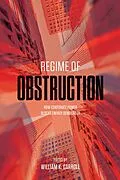Rapidly rising carbon emissions from the intense development of Western Canada's fossil fuels continue to aggravate the global climate emergency and destabilize democratic structures. The urgency of the situation demands not only scholarly understanding, but effective action.
Regime of Obstruction aims to make visible the complex connections between corporate power and the extraction and use of carbon energy. Edited by William Carroll, this rigorous collection presents research findings from the first three years of the seven-year, SSHRC-funded partnership, the Corporate Mapping Project. Anchored in sociological and political theory, this comprehensive volume provides hard data and empirical research that traces the power and influence of the fossil fuel industry through economics, politics, media, and higher education. Contributors demonstrate how corporations secure popular consent, and coopt, disorganize, or marginalize dissenting perspectives to position the fossil fuel industry as a national public good. They also investigate the difficult position of Indigenous communities who, while suffering the worst environmental and health impacts from carbon extraction, must fight for their land or participate in fossil capitalism to secure income and jobs. The volume concludes with a look at emergent forms of activism and resistance, spurred by the fact that a just energy transition is still feasible. This book provides essential context to the climate crisis and will transform discussions of energy democracy.
Contributions by Laurie Adkin, Angele Alook, Clifford Atleo, Emilia Belliveau-Thompson, John Bermingham, Paul Bowles, Gwendolyn Blue, Shannon Daub, Jessica Dempsey, Emily Eaton, Chuka Ejeckam, Simon Enoch, Nick Graham, Shane Gunster, Mark Hudson, Jouke Huizer, Ian Hussey, Emma Jackson, Michael Lang, James Lawson, Marc Lee, Fiona MacPhail, Alicia Massie, Kevin McCartney, Bob Neubauer, Eric Pineault, Lise Margaux Rajewicz, James Rowe, JP Sapinsky, Karena Shaw, and Zoe Yunker.
Autorentext
William K. Carroll is a critical sociologist with research interests in the political economy/ecology of corporate capitalism, social movements and social change, and critical social theory and method. He is the co-director of "Mapping the power of the carbon-extractive corporate resource sector," a SSHRC-funded partnership of several universities and civil-society organizations.
Inhalt
Introduction
Part 1: The Organization of Fossil Capital
1. Boom, Bust, and Consolidation: Corporate Restructuring in the Alberta Oil Sands / Ian Hussey, Éric Pineault, Emma Jackson, and Susan
2. Lines of Work, Corridors of Power: Extraction, Obstruction, and Counter-obstruction Along Fossil Fuel Production Networks / James Lawson3. Landscapes of Risk: Financial Representations of Catastrophe / Mark Hudson4. Who Owns Big Carbon? Mapping the Network of Corporate Ownership / William K. Carroll and Jouke Huijzer
5. Canada's Fossil-Capital Elite: A Tangled Web of Corporate Power / William K. Carroll
Part 2 The Struggle for Hearts and Minds
6. Fossil Capital's Reach into Civil Society: The Architecture of Climate Change Denialism / William K. Carroll, Nicolas Graham, Michael Lang, Kevin McCartney, and Zoë Yunker7. "Our Oil": Extractive Populism in Canadian Social Media / Shane Gunster, Robert Neubauer, John Bermingham, and Alicia Massie8. Episodes in the New Climate Denialism / Shannon Daub, Gwendolyn Blue, Lise Rajewicz, and Zoë Yunker
9. "Doing Things Better Together": Industry Capture of Climate Policy in British Columbia / Shannon Daub, Chuka Ejeckam, Nicolas Graham, and Zoë Yunker10. Petro-universities and the Production of Knowledge for the Post-carbon Future / Laurie Adkin11. The Oil Industry Is Us: Hegemonic Community Economic Identity in Saskatchewan's Oil Patch / Emily Eaton and Simon Enoch12. Indigenous Gendered Experiences of Work in an Oil-Dependent, Rural Alberta Community / Angele Alook, Ian Hussey, and Nicole Hill13. Between a Rock and a Hard Place: Canada's Carbon Economy and Indigenous Ambivalence / Clifford Atleo
Part 3 Resistance and Beyond
14. From Clean Growth to Climate Justice / Marc Lee
15. Flashpoints of Possibility: What Resistance Reveals About Pathways Toward Energy Transition / Karena Shaw
16. Toward a Typology of Fossil Fuel Flashpoints: The Potential for Coalition Building / Fiona MacPhail and Paul Bowles
17. Fossil Fuel Divestment, Non-reformist Reforms, and Anti-capitalist Strategy / Emilia Belliveau, James K. Rowe, and Jessica Dempsey
Conclusion: Prospects for Energy Democracy in the Face of Passive Revolution / William K. Carroll
